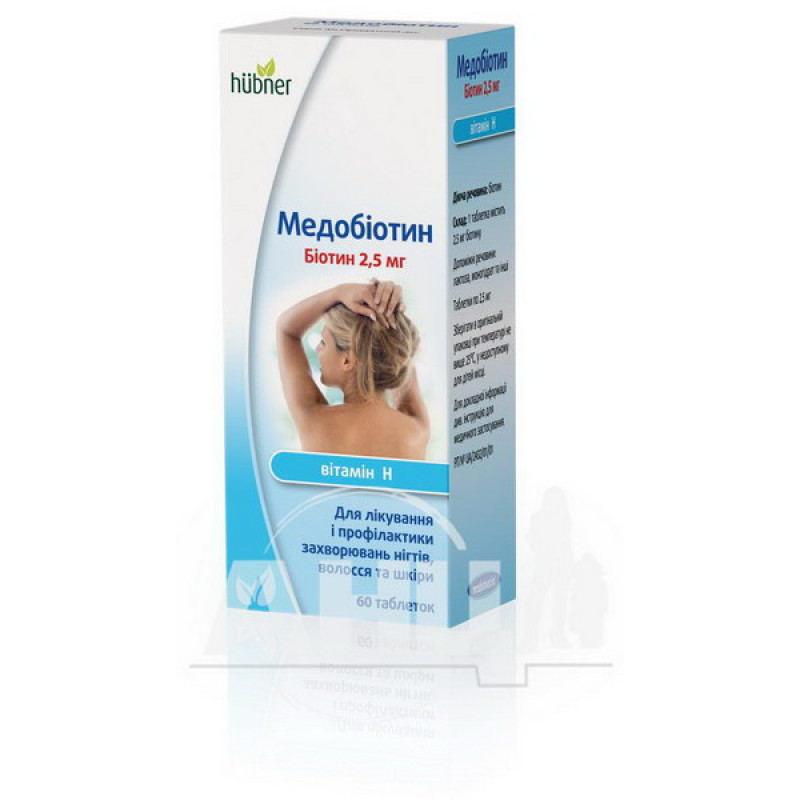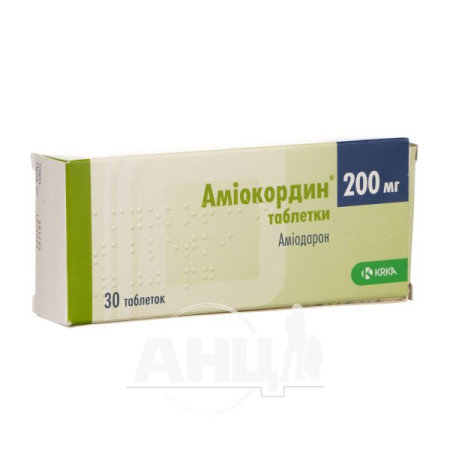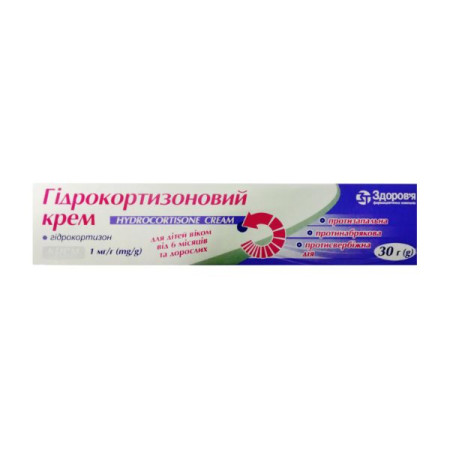Medobiotin tablets 2.5 mg No. 60

Instructions for use Medobiotin tablets 2.5 mg No. 60
Composition
active ingredient: biotin;
1 tablet contains 2.5 mg of biotin;
Excipients: long-chain partial glycerides, microcrystalline cellulose, lactose monohydrate, povidone, crospovidone, sodium starch glycolate (type A), magnesium stearate.
Dosage form
Pills.
Main physicochemical properties: white, round, biconvex tablets.
Pharmacotherapeutic group
Simple vitamin preparations. ATX code A11H A05.
Pharmacological properties
Pharmacodynamics.
Biotin is a vital substance for cell development and growth. As a coenzyme, it plays an important role in gluconeogenesis, lipogenesis, propionate biotransformation, fatty acid synthesis and leucine breakdown. Biotin deficiency can occur with unbalanced nutrition, long-term diets and consumption of raw egg protein; in addition, with biotin-associated multiple carboxylase deficiency, the need for biotin due to a genetic defect is increased. Deficiency is manifested by a reaction on the skin and its appendages, and the consequences can be specific mental symptoms and intestinal disorders during parenteral nutrition, in malabsorption syndrome, after small bowel resection, in patients on hemodialysis. Biotin (vitamin H, vitamin B7) is a water-soluble vitamin of group B. In the body, biotin plays an important role in the metabolism of carbohydrates, fats and proteins and is vital for normal cell growth and development. When ingested, biotin acts as a coenzyme of carboxylases, has an insulin-like effect and participates in the process of gluconeogenesis (due to participation in the synthesis of glucokinase), in connection with which it helps stabilize blood sugar levels, improves the function of the nervous system. Biotin is a synergist of other B vitamins, folic acid, pantothenic acid, cyanocobalamin. There is evidence of biotin's participation in the synthesis of purine nucleotides. Biotin is also a source of sulfur, which participates in the synthesis of protein - collagen, and thus has a positive effect on the structure of the skin and its appendages (hair, nails).
Biotin enters the human body from food and is also synthesized by intestinal microflora. Biotin, which is widespread in the diet, is mostly bound to protein and occurs in the form of biocytin (food of animal origin), which is rapidly reabsorbed after hydrolysis in the small intestine. In plants, biotin is partially present in free form.
Pharmacokinetics.
Absorption of free biotin begins in the upper part of the small intestine. Here, the biotin molecule penetrates the intestinal wall unchanged. Absorption occurs mainly by diffusion.
The degree of binding of biotin to blood plasma proteins is 80%.
Concentrations of free or only weakly bound biotin in the blood are usually from 200 to 1200 μg/l. Biotin is excreted in the urine (from 6 to 50 μg per day) and feces. Biotin is excreted unchanged (almost 50%) and as biologically inactive metabolites. The half-life depends on the dose administered and is almost
26 hours after oral administration of a dose of 100 mcg per kilogram of body weight. In patients with biotinidase deficiency, the half-life after administration of the same dose is reduced to 10-14 hours.
Indication
Treatment and prevention of diseases caused by biotin deficiency: skin, nail, and hair diseases.
Treatment of genetically determined enzymopathies associated with biotin (multiple carboxylase deficiency).
Contraindication
Known hypersensitivity to biotin or to other components of the drug.
Special safety measures.
Raw egg white contains the protein avidin, which interacts with biotin, so you should avoid taking them together.
Eating a large amount of raw eggs for 2-3 weeks can cause biotin deficiency.
The drug contains lactose, therefore patients with rare hereditary forms of galactose intolerance, lactase deficiency or glucose-galactose malabsorption syndrome should not use the drug.
Interaction with other medicinal products and other types of interactions
When using biotin with anticonvulsants, a decrease in the concentration of biotin in the blood plasma is possible due to increased urinary excretion. Valproic acid reduces the activity of biotinidase, reducing the function of mitochondria in the liver.
Pantothenic acid in large doses competes with biotin, so their simultaneous use should be avoided.
Use during pregnancy or breastfeeding
According to generally accepted principles, Medobiotin should be used during pregnancy or breastfeeding only if the expected benefit to the woman outweighs the potential risk to the fetus/child.
To date, there is no negative information regarding the use of the drug during pregnancy or
Breastfeeding. Biotin crosses the placenta and enters breast milk. Breast milk typically contains 7-13 mcg of biotin/L.
Ability to influence reaction speed when driving vehicles or other mechanisms
Does not affect.
Method of administration and doses
The recommended dose for adults in the treatment of biotin deficiency (diseases of nails, hair, skin) is 1-2 tablets per day.
For the treatment of genetically determined enzymopathies associated with biotin (multiple carboxylase deficiency), 2-4 tablets are prescribed (daily dose - up to 10 mg of biotin). The tablets should be taken before meals, without chewing, with sufficient liquid.
The duration of the treatment course depends on the nature and course of the disease.
Children
Due to limited experience, the drug is not used in children under 12 years of age.
Children over 12 years of age should use the drug as prescribed by a doctor; there are no dosage recommendations due to limited data.
Overdose
To date, there have been no reports of biotin overdose.
Adverse reactions
On the part of the immune system: allergic reactions, including urticaria.
If any adverse reactions occur, it is recommended to discontinue treatment and consult a doctor.
Expiration date
3 years.
Storage conditions
Store in the original packaging at a temperature not exceeding 25 °C, out of the reach of children.
Packaging
10 tablets in a blister; 3 or 6 blisters in a cardboard box.
Vacation category
Without a prescription.
Producer
Anton Hübner GmbH & Co. KG / Anton Hubner GmbH & Co. KG.
Location of the manufacturer and address of its place of business
Schlossstrasse 11-17, 79238 Ehrenkirchen, Germany.
or
Producer
mibe GmbH Arzneimittel / mibe GmbH Arzneimittel.
Location of the manufacturer and address of its place of business
Münchener Strasse 15, 06796 Brehna, Germany /Munchener Strasse 15, 06796 Brehna , G ermany .
There are no reviews for this product.
There are no reviews for this product, be the first to leave your review.
No questions about this product, be the first and ask your question.









